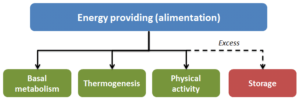The interest of proteins in weight management
13 January 2022
Nowadays, obesity is major health problem. In 2018, the WHO (World Health Organization) announced that the number of obesity cases has almost tripled since 1975. In 2016, 13% of adults were obese and 2 out of 5 people were overweight in the world 1.
Obesity and excess weight harm the overall health. They are often associated with many risks: chronic hypertension, type II diabetes, dyslipidemia (abnormal lipid concentration in blood), coronary heart disease, stroke, cancer, musculoskeletal disorders (arthrosis), sleep apnea and other respiratory problems… 1 2
Therefore, weight management, with dietary or overall lifestyle modifications, represents an important challenge for our society. A lot of publications show a great interest in proteins for the loss of fat mass or weight maintenance without muscle mass loss. 2 3 4

How are excess weight and obesity defined?
The WHO uses the Body Mass Index (BMI) to define the overweight status. This is a number which estimate the corpulence using the body weight and the size :5

For this calculation, body weight is in kilograms and the size in meter. So, the BMI is expressed in kg/m².
According to the WHO, an adult is overweight when the BMI is greater than or equal to 25 kg/m². He is obese if his BMI is greater than or equal to 30 kg.m². Generally speaking, an ideal BMI is between 18.5 and 25 kg/m².1 5
However, the BMI has some limits since it takes into account the body weight with no consideration of the body composition. That is the reason why a very muscular person can have a BMI greater than 25kg/m² without being overweight. The use of impedance metric measurement methods may appear more relevant. This kind of methods evaluates the lean mass and body fat ratio.
Another limit of the BMI is that it has to be adjusted for people under 18 years old. For them, age have to be considered in the calculation.
What is the interest of proteins in weight management?
Proteins have three interesting properties for weight management2:
- They increase satiety. Therefore, by consuming a certain amount of proteins, we will be satiated more quickly and the overall food intake will be reduced. 2 3
- They increase thermogenesis. As thermogenesis consumes energy, they consequently increase our energy expenditures.2
- They favor muscle gain. This will naturally increase energy expenditures by raising the metabolism since muscles expend energy event at rest. 2 6
However, these phenomena have been recorded in the context of a high protein diet while remaining healthy and balanced. The increase of protein intake alone is not enough.

Do proteins really create more satiety than other nutrients?
Yes they do. Different studies have shown the satiating effect of proteins. 2
Let’s consider a 2005 study, in which 19 people underwent a diet. During the first two weeks, subjects received a traditional diet with the following intakes (in % of total energy): 15% of proteins, 35% of lipids, and 50% of carbohydrates. The two following weeks, food distribution was changing: 30% of proteins, 20% of lipids, and 50% of carbohydrates. During this second period, the 19 people were split into two groups:
- Group A still consumed as much energy in total as during the first 2 weeks, i.e. 2,000kcal ;
- Group B had an ad libitum diet, i.e. they could eat until they were full.
We could imagine that group B might have consumed more calories than group A. However, the exact opposite happened: group B consumed an average of 441 kcal less than group A, which represent a reduction in energy intake of over 22%. This makes possible a weight loss of 4.9kg without hunger during the day or at the end of meals. 8 9
As a conclusion, satiety has increased thanks to proteins.
Then we talked about thermogenesis. What is this? Why increasing it may be helpful for weight management?
Thermogenesis corresponds to the production of heat by the body to maintain us to a certain temperature. For this, the body converts energy into heat. That is why thermogenesis consumes energy.
Certain nutrients naturally increase thermogenesis, especially proteins: there impact on thermogenesis is 2 to 3 times greater than carbohydrates, and up to 10 times higher than fat. 6 10 We often consider that 1g of proteins provide 4kcal to the body (17kJ), but if we subtract from this the energy consumption they generate by thermogenesis, it could be more accurate to say that 1g of proteins provide only 3.1kcal (13kJ). Following this thinking, carbohydrates would represent 3.7kcal/g (15,3kJ/g) instead of 4kcal/g. 2
Regarding the muscle mass gains, why can this be interesting for fat loss or weight maintenance?
Generally, energy expenditures of the average adult depend on three parameters (figure 1): 2
- Basal metabolism, i.e. the amount of energy consumed by the body to simply function,
- Thermogenesis,
- Physical activity.

It is commonly believed that it is only possible to act on physical activity. While in reality we can act on all three parameters, even on basal metabolism. Muscles consume energy even at rest. Since it is possible to increase muscle mass, it is therefore possible to increase basal metabolism.
Let’s take an example of 2 subjects which are identical in all points, with the exception that one has 10 more kg of muscles than the other. Basal energy expenditures for this subject will be higher by an average 100 kcal/d. This amount of energy may seem minimal, but let us suppose that a person consumes an excess of 100kcal everyday. After a year, this can represent up to 4.7kg of fat gain. 7
Therefore, it is interesting to consume more proteins to enhance muscle mass building by accompanying it with physical activity. It is also interesting to avoid muscle loss, which would lead to a decrease of the metabolism.
What are the recommended protein intakes to take advantage of these benefits?
The majority of studies which show these benefits were realized with protein intakes twice higher than minimal needs. As a reminder, this corresponds to approximately 12% of total energy intake, i.e. about 0.8g/kg/d. So, quantities used were on average 1.5 to 1,6g/kg/d.
For instance, a study conducted on 65 overweight subjects compared the effect of conventional diet with a high protein diet (twice higher than minimal needs) with the same amount of calories (reducing the amount of carbohydrates to compensate). Diets were energy-restricted so as to enhance weight loss. After 6 months, subjects who followed the high protein diet had lost on average almost twice as much weight (-8.9kg) than the others (-5,1kg). There were no significant changes for the control group. 2 11
However, for overweight people (BMI > 25 kg/m²), it may be preferable to think differently than in g/kg of body weight in order to establish the protein amount to consume daily. Therefore, in 2015, the EFSA submitted a recommendation of approximately 105g of proteins per day for an overweight adult. 12
What proteins should be consumed?
All proteins do not affect satiety, thermogenesis or muscle mass gains with the same impact. This answer will be the topic of our next article, in which we will talk about milk proteins because they are particularly interesting for weight management.

For more information, contact us.
Authors: Rémi Maleterre & Audrey Boulier.
_______________________________________________________________________________________________
[1] « Obesity and overweight». World Health Organization. WHO. February 16, 2018 [consulted: july 09, 2019]. https://www.who.int/news-room/fact-sheets/detail/obesity-and-overweight
[2] D. Paddon-Jones, E. Westman, R.D. Mattes, R.R. Wolfe, A. Astrup, M. Westerterp-Plantenga (2008). Protein, weight management, and satiety. The American Journal of Clinical Nutrition, Volume 87, Issue 5, May 2008, Pages 1558S–1561S. Pub May 01, 2008. https://doi.org/10.1093/ajcn/87.5.1558S
[3] Soenen S., Westerterp-Plantenga, Margriet S. (2008). Proteins and satiety: implications for weight management. Clinical Nutrition and Metabolic Care. Vol 11:6, 747-751. Pub November 2008. https://doi.org/10.1097/MCO.0b013e328311a8c4
[4] Noakes M. (2008). The role of protein in weight management. Asia Pacific Journal of Clinical Nutrition. 17:S1, 169-171. Pub January 2008. https://doi.org/10.6133/apjcn.2008.17.s1.41
[5] Nuttall F.Q. (2015). Body Mass Index. Nutr Today, 50(3):117-128. Epub April 07, 2015. https://doi.org/10.1097/NT.0000000000000092
[6] L. Tappy (1996). Thermic effect of food and sympathetis nervous system activity in humans. Reprod Nutr Dev. 36(4):391-7. Pub 1996.
[7] R.R. Wolfe (2006). The underappreciated role of muscle in health and disease. Am J Clin Nutr. 84(3):475-482. https://doi.org/10.1093/ajcn/84.3.475
[8] A. Astrup (2005) The satiating power of protein – a key to obesity prevention? Am J Clin Nutr. 82(1):1-2. Pub July 2005. https://doi.org/10.1093/ajcn.82.1.1
[9] D.S. Weigle, P.A. Breen, C.C. Matthys, H.S. Callahan, K.E. Meeuws, V.R. Burden, J.Q. Purnell (2005) A high-protein diet induces sustained reductions in appetite, ad libitum caloric intake, and body weight despite compensatory changes in diurnal plasma leptin and ghrelin concentrations. Am J Clin Nutr. 82:41– 8. Pub July 2005. https://doi.org/10.1093/ajcn.82.1.41
[10] Halton T.L. (2004). The effects of high protein diets on thermogenesis, satiety and weight loss : a critical review. Journal of American College of Nutrition, 23(5), 373-385. https://doi.org/10.1080/07315724.2004.10719381
[11] A.R. Skov, S. Toubro, B. Ronn, L. Holm, A. Astrup (1999). Randomized trial on protein vs carbohydrate in ad libitum fat reduced diet for the treatment of obesity. Int J Obes Relat Metab Disord 1999;23:528 –36. Pub May 1999.
[12] EFSA (European Food Safety Authority). Scientific Opinion on the essential composition of total diet replacements for weight control. EFSA Journal 2015;13(1):3957.